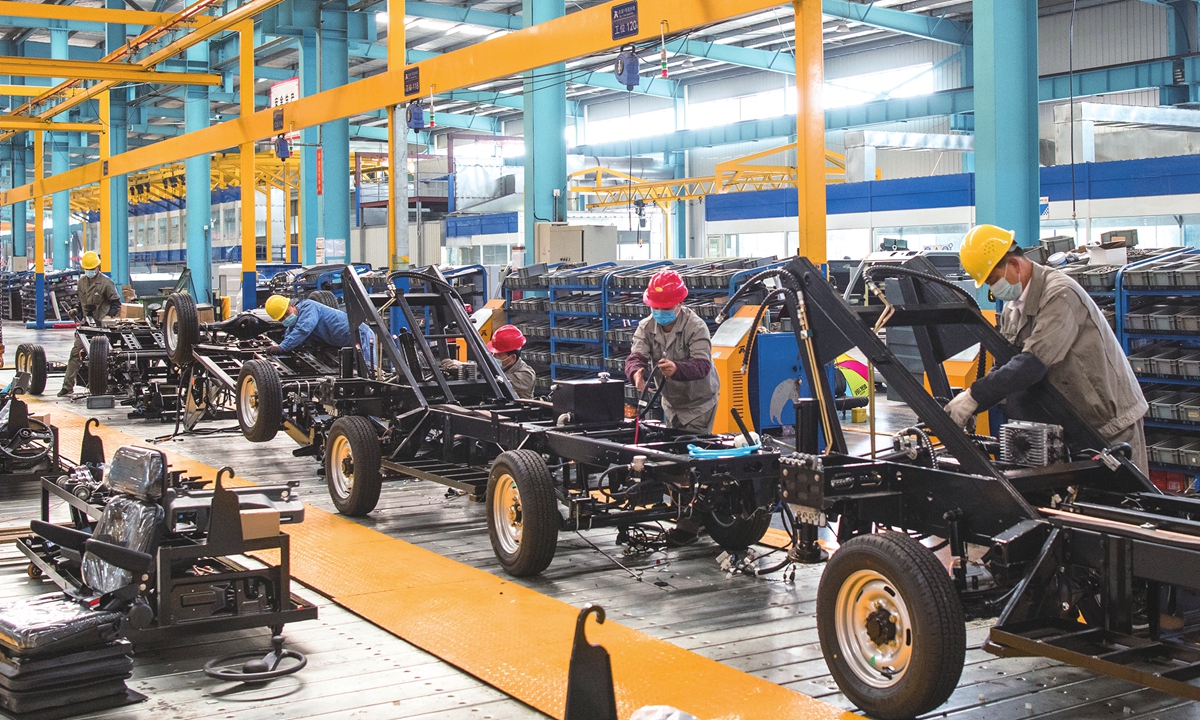
Staffers work at a new-energy vehicle company in Wuhu, East China’s Anhui Province on April 14, 2022. China’s new-energy vehicle sector has maintained continuous rapid growth despite the negative effects of COVID-19, chip shortages and lithium price rises, officials from the China Passenger Car Association said. Photo: cnsphoto
China’s Ministry of Industry and Information Technology (MIIT) on Monday released a sweeping plan to accelerate the establishment of standards for automotive chips, in a bid to further boost research and development (R&D) of the critical product amid increasing international competition.
The move comes after China became the world’s biggest car exporter in 2023, thanks to its rapidly rising new-energy vehicle (NEV) sector, and as China continues to counter the US-initiated chip war and build a sound and safe industrial supply chain for critical components not just for cars but also other high-tech products.
The plan aims to establish a complete set of standards, so as to guide and promote the development and application of China’s automotive chip technology, cultivate an independent innovation environment, enhance overall technological capabilities and competitiveness, and create a safe, open and sustainable ecosystem, the MIIT said.
Notably, the plan said that China will set up more than 30 critical standards by 2025, covering areas such as reliability, electromagnetic compatibility and operational and information security. This will meet the basic needs for safe and reliable application of automotive chips, the MIIT said.
By 2030, China will establish more than 70 standards for the automotive chip sector, which will further improve the general requirements for the application of automotive chips and other aspects, according to the plan. It will offer effective support for the R&D of forward-looking and integrated automotive chips and help to build a safe, open and sustainable industry.
Amid fierce international competition and the US’ attempts to deprive China of advanced chips, a sound and reliable domestic automotive chip industry is critical for China’s rising NEV sector, which requires a rapidly increasing number of chips.
In 2012, NEVs generally used less than 600 chips on average, but that number jumped to 1,459 in 2022, according to industry data. And as the NEV sector becomes more mature, increasingly advanced chips are required.
As part of efforts to boost the domestic chip industry, China has also taken various measures to support the automotive chip sector in a wide range of aspects. For instance, Shanghai launched an automotive integrated circuit testing and certification public lab. Many Chinese carmakers have also stepped up R&D of auto chips.
China has taken the lead in the global NEV market. In the first 11 months of 2023, China's exports of NEVs jumped 83.5 percent year-on-year to 1.09 million units, which greatly contributed to China’s total car exports of 4.41 million units, surpassing that of Japan and making China the world’s biggest car exporter.
